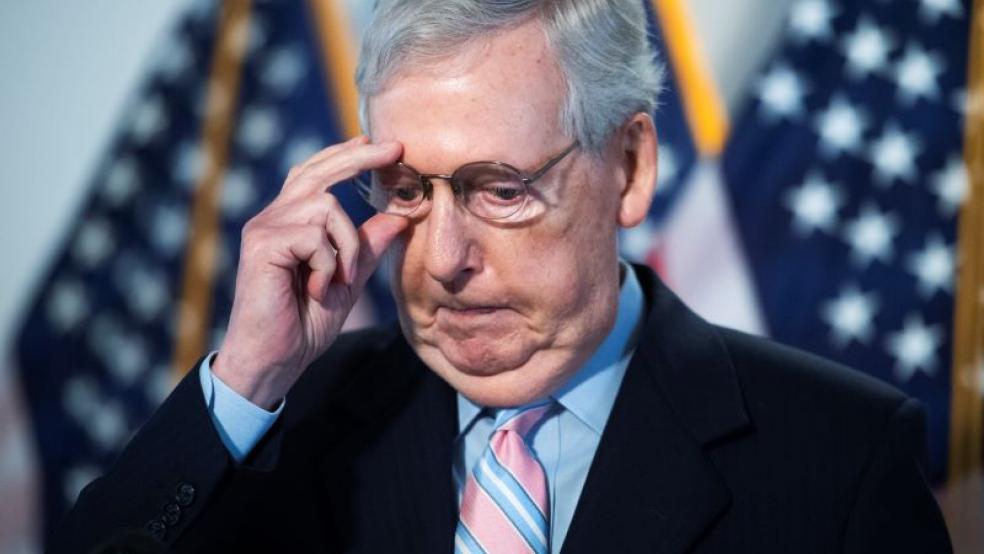The coronavirus relief bill released by Senate Majority Leader Mitch McConnell (R-KY) yesterday received plenty of criticism Tuesday — with much of it coming from fellow Republicans.
At a lunch with Trump administration officials, some GOP senators reportedly complained about the $1 trillion price tag of the package, their lack of input in the bill’s writing process and the puzzling inclusion of funds to build a new FBI headquarters building across the street from the Trump International Hotel in Washington.
Highlighting the lack of unity among Republicans, Sen. Lindsey Graham (R-SC) said, “I think if Mitch can get half the conference that’d be quite an accomplishment.”
Saying he didn’t really know what was in the bill, John Kennedy (R-LA) joked that Republicans “have unity in disagreement.”
Sen. Josh Hawley (R-MO) said he was baffled by the proposal. “It’s a mess,” he said. “I can’t figure out what this bill is about. I don’t know what we’re trying to accomplish with it.”
Storming out of the meeting early, Sen. Rand Paul (R-KY) criticized the bill’s cost. “It’s just very frustrating to me because it’s people who go home and say we’re fiscally conservative, [and] are now in a bidding contest with the Democrats to see how much money they can spend,” he said.
Sen. Rick Scott (R-FL) seemed to share those concerns, particularly the proposal to provide state and local governments with more flexibility to spend federal funds. “I’m very concerned about the amount of money we’re talking about,” Scott said. “What I don’t want to do is bail out the states. That’s wrong.”
McConnell responds: The majority leader recognized the party divisions Tuesday. “I have members who are all over the lot on this,” he said. “This is a complicated problem. We’ve done the best we can to develop a consensus among the broadest number of Republican senators — and that’s just the starting point, that’s just where we begin in dealing with the other side and with the administration.”
McConnell added that he assumed the final bill would be more focused. “When we get to the end of the process, I would hope all of the non-Covid-related measures are out, no matter what bill they were in at the start,” he said.
The unrelated measures include the controversial funding request for the FBI headquarters. On Tuesday, the Trump administration admitted that the request had nothing to do with the pandemic. “There are a number of things in the last bill that had nothing to do with the coronavirus,” said White House Chief of Staff Mark Meadows. “I think everybody acknowledges that it’s a funding mechanism."
Democrats no less critical: Democratic leaders said that the Republican bill gave them little to work with. “The Senate GOP proposal is a sad statement of their values, selling out struggling families at the kitchen table to enrich the corporate interests at the boardroom table,” House Speaker Nancy Pelosi (D-CA) and Senate Minority Leader Charles E. Schumer (D-NY) said in a statement. Pelosi also said that she couldn’t understand why Republicans would offer a bill that lacked support from within their own party.
Tough negotiations ahead: The discord in Washington suggests that it could take a good deal of time and effort to reach an agreement for the next coronavirus bill.
As bipartisan negotiations on the next coronavirus package get underway, Politico’s Jake Sherman and Anna Palmer noted in their Tuesday morning Playbook that “the general consensus of aides in both parties, on both ends of Pennsylvania Avenue, is that Democrats have a healthy negotiating edge” given that a broad portion of the Senate Republican caucus is going to oppose the bill, making Democratic support all the more crucial.
Playbook laid out three scenarios for how the talks could go in the near term:
1. A quick deal: “The two sides scramble to reach agreement this week. That’s not going to be easy at all. One side would have to cave.”
2. A short-term patch: House Speaker Nancy Pelosi has made clear she has no interest in a narrower, short-term deal that would push off a more sweeping package. “A short-term deal would require acrobatics,” Sherman and Palmer write, “and that kind of maneuvering may be hard to come by.”
3. Enhanced unemployment benefits expire and the pressure builds: “Frankly, it seems likelier than not that Congress will be unable to do anything by Friday. If so, enhanced unemployment benefits will run out, which will scramble all sorts of considerations.”
The House is scheduled to leave town at the end of this week for an extended summer break. House Majority Leader Steny Hoyer (D-MD) said lawmakers would be on call to return for a vote — but that would require a bill being ready for them to vote on.





